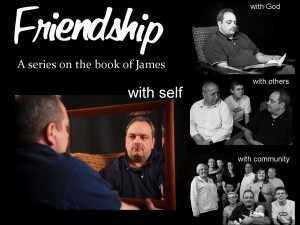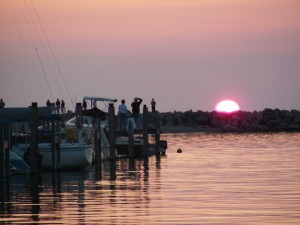Friendship with Self: A Series on the Book of James
Sycamore Creek Church
James 1:1-4
Tom Arthur
May 30, 2010
Peace, Friends!
Does anyone like watching sunsets? Before I went to seminary, Sarah and I lived in Petoskey for eight years and had the opportunity to see many amazing sunsets. Petoskey is one of the best places to watch sunsets. Petoskey is on what is called the sunset side of the state as compared to the eastern shore on Lake Huron which is called the sunrise side of the state. Ironically enough, the name “Petoskey” comes from Chief Petosega, the son of a wealthy French fur trader and an Odawa princess, and means “Rising Sun.” There is a park in Petoskey called “Sunset Park,” and it is perched over the waterfront up on an old quarry cliff. From this vantage point one can easily and perfectly see the sun over the marina and all the rigging of sail boats right in the middle of the Little Traverse Bay. Here the “sun comes out like a bridegroom from his wedding canopy and runs his course with joy” (Psalm 19). Many nights Sarah and I have gotten Kilwin’s ice-cream and spent the last hours of the day simply watching the sun go down.
Another interesting feature of Petoskey are the clouds. There are about an equal number of sunny days in the year as there are cloudy days. Unfortunately most of the cloudy days congregate in the winter and most of the sunny days gather together in the summer. Generally speaking, clouds in our culture symbolize trouble. They hint at or forecast rain or even great storms. Sarah and I sailed with a friend for ten days from Northern Michigan to Up-state New York. It seemed we were always trying to outrun a front of clouds and storms. It also seemed like we were always losing that race. One time we made it into a harbor just as the clouds burst forth both rain and lightning. We hunkered down as the winds blew the boat to and fro. Soon we found ourselves aground in the harbor. Clouds were not something we looked forward to. In fact, there’s even a disorder based on the clouds. It’s called “SAD” or seasonal affective disorder. When some people go so many cloudy days, then they become depressed. There is a high rate of SAD in Northern Michigan.
Now here’s the odd thing about clouds and sunsets that I began to notice after eight years of watching them: it’s the clouds that make the sunset. If there are no clouds in the sky when the sun sets, it can be beautiful, but when there are clouds in the sky as the sun sets, the sunset is often spectacular! The clouds make the sunset. The clouds provide the character for the light of the sun to make beautiful.
Consider these pictures I’ve taken in various places. Here is a picture of the sun setting in Petoskey over the break wall. Beautiful.
But here’s a picture of the same Little Traverse Bay and sunsets with clouds. Stunning!
I also love backpacking and seen many sunsets from a campsite. Here’s a picture I took while on Grand Island in the Upper Peninsula looking out over Lake Superior. It’s a beautiful sunset.
But here’s a picture on a trip with the same group of guys, several years later, on Charlie’s Bunion along the Appalachian Trail in the Great Smokey Mountains National Park in North Carolina. This time the sunset has clouds. Incredible!
The same phenomenon happens no matter where you’re at in the world. While traveling in the Middle East I took this picture from the top of a crusader castle in Palmyra, Syria. The sun was setting over the vast desert. Not a cloud in sight. It was a beautiful sunset.
But here’s a picture from the same trip. This time from Hydra Island looking out over the Mediterranean Sea. Clouds are in this sunset. Magnificent!
You see, it’s the clouds that make the sunset. It’s the things in our atmosphere that we consider to be negative, that give us trouble that actually give the sunset its beautiful character. The clouds make the sunset.
I think this same basic idea is present in the book of James when he talks about the trials and troubles that come our way. Listen for this same basic concept as I read the very beginning of the book of James
James 1:1-4
1 This letter is from James, a slave of God and of the Lord Jesus Christ. It is written to Jewish Christians scattered among the nations. Greetings!
2 Dear brothers and sisters, whenever trouble comes your way, let it be an opportunity for joy. 3 For when your faith is tested, your endurance has a chance to grow. 4 So let it grow, for when your endurance is fully developed, you will be strong in character and ready for anything.
This is God’s story, God’s teaching for us today. Thank you, God!
Did you catch how James sees the clouds making the sunset? Trouble should equal joy, because joy equals endurance and endurance equals growth and growth equals maturity. This is what it means to grow in your friendship with yourself: to grow in maturity.
James is very interested throughout his whole book in the idea and process of maturity. The Greek word behind maturity is “teleios” and it shows up five different times in the book of James. The old-school way of translating “teleios” was “perfection.” Perfection? Can we really reach perfection? That’s a pretty crazy idea. Perhaps “maturity” is a better way to understand teleios. Let’s walk through James and see what exactly James means by perfection or maturity.
First, maturity is a gift from God. James says, “Whatever is good and perfect [teleios] comes to us from God above, who created all heaven’s lights. Unlike them, he never changes or casts shifting shadows” (1:17, NLT). Maturity isn’t so much about something we do but about what God does in us. When I first started exploring this issue of maturity or perfection, I asked my grandmother what she thought about it all. She was a woman that I looked up to in terms of her faith. Our initial conversation was on the phone, and I was so struck by what she had to say that I asked her to write it down for me. She wrote me a letter to tell me about it. Here’s what she said:
My witness to God’s sanctifying power.
Jesus took our 7-year old son, John Paul in death in 1951. John Paul had been ill 5 months with meningitis. We sat by his bed side many hours, talking, reading to him and playing records. He had loved the Christmas records. One day we were listening to “Oh Come All Ye Faithful.” He had been in a coma for days. As the record played he said, “Joyful and triumphant.” I said, “Oh! John Paul, where have you been?” He said, “I have been in my own fair home and you weren’t there.”
From that time on he seemed to improve, could set up and be in a walker that had a seat.
One Sunday morning, as Paul [her husband] was preparing for church, John Paul asked, “Where is my Daddy.” Paul went to him so he would know his Daddy was there.
When Paul returned from church he saw something was wrong. I rushed to him and spoke his name. He heard me for he said, “Here,” and he was gone. God took him from our care.
After this I wanted more than ever to be ready for heaven. We had written on his grave stone—Heaven is nearer since he entered there.
I prayed and read the Bible more seeking more of God. Paul was working. Judy [my mom, and her oldest and now only child] was in first grade so I had time alone. In searching I learned that the Holy Spirit was the gift of God to believers. All I needed to do was to accept the gift holiness [perfection/maturity]. As I believed that instant I felt a gentle warming of my body from the top of my head to the bottom of my feet and I knew that the Holy Spirit had entered my life. [On the phone she told me that had happened while she was washing the windows.]
Were there any changes? Only that I knew I was renewed in spirit and there was a desire to serve and labor for the Lord. The church gave us plenty to do.
I know that this gift of the Holy Spirit doesn’t come in such feeling to every one. I remember asking my mother how she knew she was sanctified. She said it was just the knowledge that she was committed completely to the Lord [perfection/maturity]…
Mary White
Two things I think worth noticing in this letter are that she considered the gift of maturity, complete commitment to the Lord, a gift that comes from the Holy Spirit. The second is that this gift came during a time of intense trial, trouble, and suffering. Maturity is a gift, and according to James, this gift often comes in times of trouble.
Second, maturity is a completeness that lacks nothing. James says, “And let endurance have its full [teleios] effect, so that you may be mature [teleios] and complete, lacking in nothing” (1:4, NRSV). I mentioned earlier that I went on a ten-day sailing trip with a friend from Northern Michigan to upstate New York. This trip was filled with all kinds of clouds, literally. We began in Lake Michigan and then sailed down Lake Huron into Lake St. Clair. From there we sailed east through Lake Erie. We by-passed Niagara Falls by way of the Welland Canal. We finished our trip in Lake Ontario. By the end of those ten days and the troubles we had encountered, we were more prepared to meet the same troubles again. I don’t know that I was out long enough and encountered so many troubles that I am yet to the point of lacking nothing when it comes to sailing (in fact, I know that I am not because the next summer I ran another friend’s sailboat aground!), but I am a more “mature,” more “perfect” sailor than I was when I began. Perfect maturity is a completeness that lacks nothing. Growing in maturity is a process of growing in that direction.
Third, maturity perseveres in doing good. James says, “But those who look into the perfect [teleios] law, the law of liberty, and persevere, being not hearers who forget but doers who act—they will be blessed in their doing” (1:25, NRSV). In other words, you may not feel like doing good, but as you grow in maturity you no longer are controlled by your feelings. Maturity is knowing the good that needs to be done and doing it no matter what you feel like doing. When you do what is good even when you don’t feel like it, when you persevere, you receive a blessing. How many of you have ever come to church when you didn’t feel like it and left glad that you came? One time I was planning a hike with a friend on the John Muir trail in Yosemite. We were going to hike 55 miles over five days. One of those days included sixteen miles and 2500 feet of elevation. Did I mention that my friend is also an Ironman? Yes, he swam 2.4 miles, rode 112 miles on his bike, and ran a 26 mile marathon all in one day. You know what I had to do to be ready for this trip? Train. Hard! When I began I could barely go ten minutes on a Stairmaster. By the time I was done I could easily stay on the Stairmaster for an hour or more. I did not particularly feel like or want or enjoy training almost every day for six months for that hike, but when I finally hit the trail, I was more prepared for a hike than I had ever been. The best part about it was that I seriously enjoyed the hiking. Yes, I was sore at the end of every day, but by the morning I had completely recuperated. I persevered in training and received the blessing of the joy of the trail, the joy of being outside. Maturity perseveres in doing good no matter what you feel like.
Fourth, it is worth pointing out one thing that maturity is not. It is not absolute perfection where you never make mistakes. James says, “All of us make many mistakes. Anyone who makes no mistakes in speaking is perfect [teleios], able to keep the whole body in check with a bridle” (3:2, NRSV). There is a tension, I think, in this verse. On the one hand James says that making no mistakes in speaking is perfection, but this comes on the heels of him having just said that all of us make many mistakes! So which is it? Mistakes or no mistakes? I think what he’s saying is that we all make mistakes, and we can grow in making fewer and fewer mistakes with our tongues. When I first talked to my grandmother on the phone about perfection and maturity, I asked her if she ever made mistakes after she had received this gift of the Holy Spirit of complete devotion to the Lord. She said that she certainly did make mistakes, and that she had to ask for forgiveness for them all. The difference seemed to be that she did not intentionally seek to disobey God or hurt others, but she still made mistakes.
Maturity for James is a gift of God that brings one to a place of maturity by way of endurance through trials and trouble so that one perseveres in the good works of loving one’s neighbor as oneself.
Perhaps this morning, you’re saying to me, “Tom, I get it. I see that clouds make the sunset. The troubles in our lives are like clouds upon which the sun of God’s grace can shine and create character. Let me tell you though. I’ve go so much trouble that the sky of my life is entirely overcast. The light of the sun can’t even shine through. God has forgotten me.”
I agree. Sometimes there are so many troubles in our lives that we can’t see any of God’s grace. Sometimes it really looks like God has forgotten us, but did you know that when the sky is entirely overcast, that there is a sunset on the other side, above the clouds? You may not be able to see it, but from another perspective, from God’s perspective, something amazing is happening. The clouds make the sunset, and occasionally only God can see it.
O merciful Father, who has taught us in your holy Word that you do not willingly afflict or grieve the children of humanity: Look with pity upon the sorrows of your servants for whom our prayers are offered. Remember us, O Lord, in mercy , nourish our souls with patience, comfort us with a sense of your goodness, lift up your countenance upon us, and give us peace, through Jesus Christ our Lord. Amen. (Book of Common Prayer)









Recent Comments